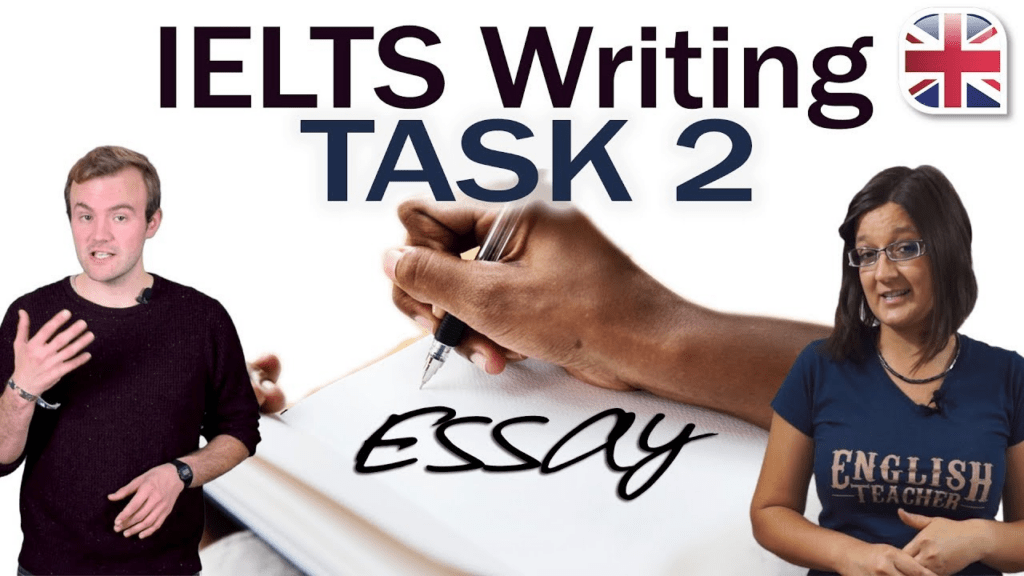Preparing for the IELTS Writing test can be daunting, but understanding the different types of essays you might encounter is a crucial step towards success. In this blog post, we’ll explore the four main types of essays in IELTS Writing: Opinion, Discussion, Problem-Solution, and Advantage-Disadvantage. We’ll also share key features and tips to help you boost your score.
I. Structure of a Winning Writing Task 2 Essay
A high-scoring essay includes four paragraphs:

Introduction (2-3 sentences):
- Present the topic: Nowadays, … / In recent years, … / Currently, …
- Address the question: Many people argue that … / While some believe that …, others think that … / This essay will discuss both views and …
Body Paragraph 1 (4-5 sentences):
- Topic sentence: One reason why … / First and foremost, … / To begin with, …
- Develop the idea with explanations or examples: For example, … / This can be seen in … / Such as … / An illustration of this is …
- Support your points with relevant details: Furthermore, … / Additionally, … / Moreover, …
Body Paragraph 2 (4-5 sentences):
- Topic sentence: On the other hand, … / Conversely, … / In contrast, …
- Develop the idea with explanations or examples: For instance, … / This is evident in … / An example of this is …
- Provide supporting details or refute the counterargument: Similarly, … / In addition, … / However, … / Nevertheless, …
Body Paragraph 3 (optional, 4-5 sentences):
- Topic sentence: Additionally, … / Another point to consider is … / Moreover, …
- Further development with explanations or examples: For example, … / This can be illustrated by … / An instance of this is …
- Support with relevant details: Furthermore, … / Additionally, … / In particular, …
Conclusion (1-2 sentences):
- Summarize the main points or restate your thesis: In conclusion, … / To summarize, … / Overall, …
- Provide a final thought or recommendation: Therefore, … / Thus, … / It is evident that … / I believe that …
II. Types of Essays in IELTS Writing
1. Opinion Essays

Overview
Opinion essays, also known as argumentative essays, require you to present your viewpoint on a given topic. You’ll need to clearly state your opinion and support it with logical arguments and relevant examples.
Key Features
- Clear introduction stating your opinion.
- Body paragraphs presenting arguments to support your opinion.
- Opposing viewpoints (optional but can strengthen your essay).
- Conclusion summarizing your opinion and main points.
Tips
- Be consistent with your opinion throughout the essay.
- Use linking words and phrases to ensure coherence and cohesion.
- Provide specific examples to back up your arguments.
Reference
https://ca.indeed.com/career-advice/career-development/how-to-write-an-opinion-essay
2. Discussion Essays

Overview
In discussion essays, you need to discuss both sides of an issue before giving your own opinion. This type of essay tests your ability to present balanced arguments.
Key Features
- Introduction outlining the topic and stating that both sides will be discussed.
- Body paragraphs discussing each side of the argument.
- Your opinion (either in a separate paragraph or integrated into the conclusion).
- Conclusion summarizing the discussion and stating your opinion.
Tips
- Ensure each body paragraph focuses on a single point of view.
- Use a variety of linking words to compare and contrast ideas.
- Maintain a neutral tone when discussing opposing viewpoints before presenting your opinion.
Reference
3. Problem-Solution Essays

Overview
Problem-solution essays require you to identify a problem related to a given topic and propose solutions. These essays test your ability to analyze issues and suggest practical solutions.
Key Features
- Introduction outlining the problem.
- Body paragraphs discussing the problem and its causes.
- Proposed solutions with detailed explanations.
- Conclusion summarizing the problem and solutions.
Tips
- Clearly define the problem in the introduction.
- Use logical reasoning to connect the problem with its causes.
- Propose feasible and realistic solutions.
- Support your solutions with examples or evidence.
Reference
https://www.ieltsjacky.com/ielts-problem-solution-essays.html
4. Advantage-Disadvantage Essays

Overview
In advantage-disadvantage essays, you need to discuss the positive and negative aspects of a given topic. These essays test your ability to present a balanced analysis.
Key Features
- Introduction outlining the topic.
- Body paragraphs discussing the advantages.
- Body paragraphs discussing the disadvantages.
- Conclusion summarizing the advantages and disadvantages and stating your overall opinion.
Tips
- Ensure a balanced discussion by giving equal weight to both advantages and disadvantages.
- Use linking words to contrast points.
- Be clear and concise in your analysis.
- Conclude with your opinion or a summary of the discussion.
Reference
https://www.ieltsjacky.com/ielts-advantages-and-disadvantages-essays.html
III. General Tips to Boost Your IELTS Writing Score

- Understand the Essay Type: Before you start writing, make sure you understand what type of essay is required. This will help you structure your essay appropriately.
- Plan Your Essay: Spend a few minutes planning your essay. Outline your main points and decide on the structure before you start writing.
- Practice Regularly: Regular practice is essential to improve your writing skills. Write essays on a variety of topics to build your confidence.
- Seek Feedback: Get feedback from teachers, peers, or online resources to identify areas for improvement.
- Expand Your Vocabulary: A rich vocabulary can enhance your writing. Learn new words and phrases and practice using them in your essays.
- Focus on Grammar and Punctuation: Accurate grammar and punctuation are crucial for a high score. Pay attention to sentence structure, verb tenses, and punctuation marks.
References
https://ted-ielts.com/planning-ielts-writing-task-2-structure/




